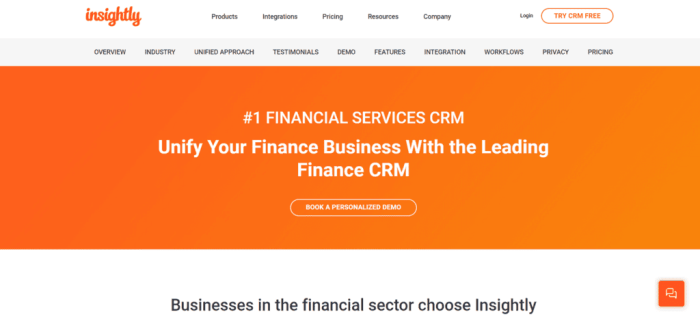Crm software for financial services industry – The financial services industry operates in a highly competitive and regulated environment. Building and maintaining strong client relationships is paramount for success. Customer Relationship Management (CRM) software plays a crucial role in achieving this, providing a centralized platform to manage interactions, track progress, and ultimately drive revenue growth. This comprehensive guide explores the specific needs of financial institutions and how CRM solutions can effectively address them.

Source: lio.io
Why Financial Services Need Specialized CRM Software
Generic CRM systems often lack the specific features and functionalities required by the financial services industry. These specialized needs stem from stringent regulatory compliance requirements, the complexity of financial products, and the need for secure data management. Key differences include:
Regulatory Compliance and Security
- Data Security and Privacy: Financial data is highly sensitive, requiring robust security measures like encryption, access controls, and audit trails. A specialized CRM must adhere to regulations like GDPR, CCPA, and industry-specific guidelines (e.g., FINRA for broker-dealers).
- Audit Trails and Reporting: Comprehensive audit trails are crucial for demonstrating compliance and meeting regulatory requirements. The CRM should automatically log all user activity and provide detailed reports for audits.
- KYC/AML Compliance: Know Your Customer (KYC) and Anti-Money Laundering (AML) compliance are essential. The CRM should integrate with KYC/AML screening tools and facilitate the efficient management of client due diligence processes.
Complex Product Management and Client Onboarding, Crm software for financial services industry
- Product Catalog Management: Financial institutions offer a diverse range of products and services (loans, investments, insurance, etc.). The CRM must effectively manage this complexity, allowing for easy searching, filtering, and presentation of relevant products to clients.
- Client Onboarding and Lifecycle Management: The CRM should streamline the client onboarding process, from initial contact to account opening and ongoing relationship management. It should also support lifecycle management, tracking interactions and milestones throughout the client’s journey.
- Personalized Communication: Tailoring communication to individual client needs and preferences is critical. A good CRM enables personalized messaging, targeted marketing campaigns, and proactive service delivery.
Advanced Analytics and Reporting
- Performance Tracking and Reporting: Financial institutions need detailed reports on key performance indicators (KPIs) such as sales conversion rates, customer acquisition costs, and client retention rates. The CRM should provide customizable dashboards and reporting capabilities.
- Predictive Analytics: Leveraging data analytics to predict client behavior, identify potential risks, and anticipate future needs is crucial. Advanced CRM solutions integrate with predictive analytics tools to provide valuable insights.
- Risk Management: The CRM should facilitate risk assessment and management by providing tools to identify and monitor potential risks associated with clients and transactions.
Key Features of a Financial Services CRM
A robust CRM for financial services should include the following features:
- Contact Management: Centralized storage and management of client information, including contact details, account information, transaction history, and communication logs.
- Sales Force Automation (SFA): Tools to manage the sales process, track leads, manage opportunities, and automate sales tasks.
- Marketing Automation: Automated marketing campaigns, email marketing, and lead nurturing capabilities.
- Customer Service and Support: Tools for managing customer inquiries, resolving issues, and providing support.
- Reporting and Analytics: Customizable dashboards, reports, and analytics to track performance and identify trends.
- Integration Capabilities: Seamless integration with other systems, such as accounting software, loan origination systems, and compliance tools.
- Workflow Automation: Automation of repetitive tasks to improve efficiency and reduce manual errors.
- Mobile Accessibility: Access to client information and CRM functionalities from mobile devices.
Choosing the Right CRM for Your Financial Institution
Selecting the right CRM requires careful consideration of your specific needs and requirements. Factors to consider include:
- Scalability: The CRM should be able to handle your current and future growth.
- Customization: The ability to customize the CRM to fit your specific workflows and processes.
- Integration: Compatibility with your existing systems and technologies.
- Cost: The total cost of ownership, including licensing fees, implementation costs, and ongoing maintenance.
- Vendor Support: The level of support and training provided by the vendor.
- Security: The security features and compliance certifications of the CRM.
Examples of CRM Software for Financial Services
Several vendors offer CRM solutions specifically designed for the financial services industry. Some popular options include Salesforce Financial Services Cloud, Microsoft Dynamics 365 for Finance, and specialized solutions from smaller providers focusing on niche markets within finance.
Frequently Asked Questions (FAQ)
- Q: What are the benefits of using CRM software in financial services?
A: Improved customer relationships, increased efficiency, enhanced compliance, better data management, improved sales and marketing performance, and better risk management.
- Q: How much does CRM software cost?
A: Costs vary greatly depending on the vendor, features, and number of users. Expect a range from subscription-based models to significant upfront investments for enterprise-level solutions.
- Q: What are the key security considerations when choosing a financial services CRM?
A: Data encryption, access controls, audit trails, compliance certifications (e.g., SOC 2, ISO 27001), and regular security assessments are critical.
- Q: How can I ensure my CRM is compliant with regulations?
A: Choose a vendor with a strong track record of compliance, thoroughly review their security features and compliance certifications, and implement robust internal controls and processes.
- Q: What are the common challenges in implementing a CRM in a financial institution?
A: Data migration, user adoption, integration with existing systems, and ensuring compliance with regulations are common hurdles.
Conclusion
Implementing a robust CRM system is a strategic investment for financial institutions. By carefully selecting a solution that meets their specific needs and addressing the challenges of implementation, financial services firms can significantly improve customer relationships, enhance operational efficiency, and achieve sustainable growth. The right CRM empowers businesses to focus on what matters most: building lasting client relationships and delivering exceptional service.
References: Crm Software For Financial Services Industry
- Salesforce Financial Services Cloud
- Microsoft Dynamics 365 for Finance
- (Add other relevant links here)
Call to Action
Ready to transform your financial services business with a powerful CRM? Contact us today for a free consultation to discuss your specific needs and explore the best solutions for your institution.
Popular Questions
What are the key features of CRM software for financial services?
Key features include client relationship management, sales automation, marketing automation, reporting and analytics, compliance tools, and secure data management.
How does CRM improve compliance in financial services?
CRM systems help ensure compliance by providing tools for audit trails, regulatory reporting, and maintaining accurate client records, minimizing risk.
What are the common challenges in implementing CRM in financial services?

Source: switchonbusiness.com
Common challenges include data integration, system migration, user adoption, and ensuring data security and privacy in accordance with regulations.
What is the return on investment (ROI) for CRM in financial services?

Source: insidea.com
ROI varies depending on implementation and usage, but benefits include increased efficiency, improved client satisfaction, reduced operational costs, and enhanced revenue generation.
How do I choose the right CRM for my financial institution?
Consider factors such as scalability, integration capabilities, regulatory compliance features, user-friendliness, and cost. Seek out vendors with experience in the financial services sector.
